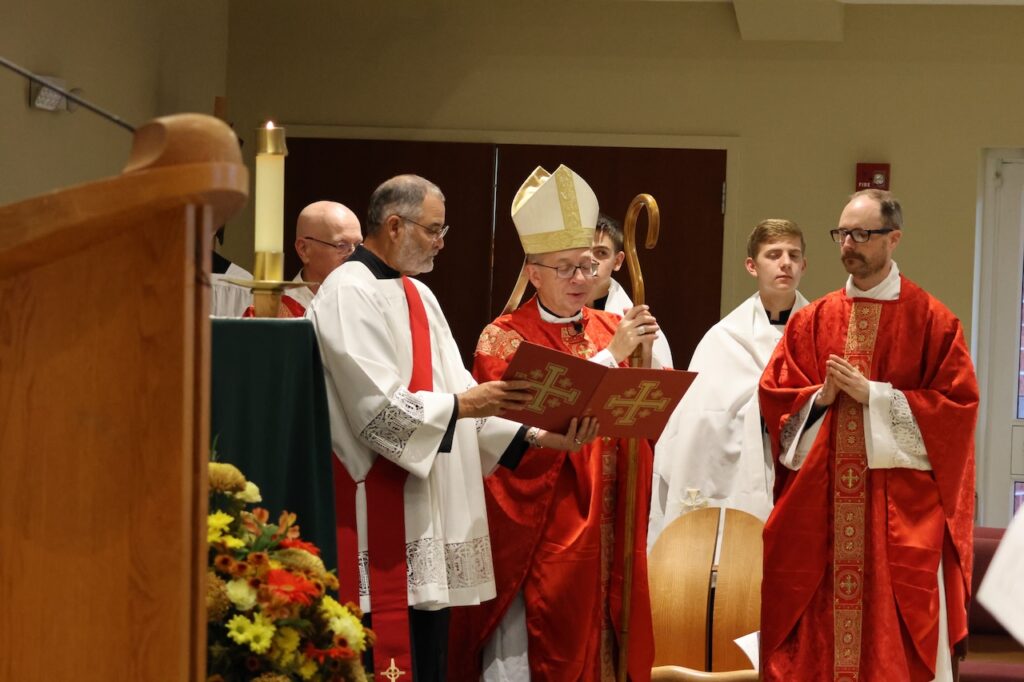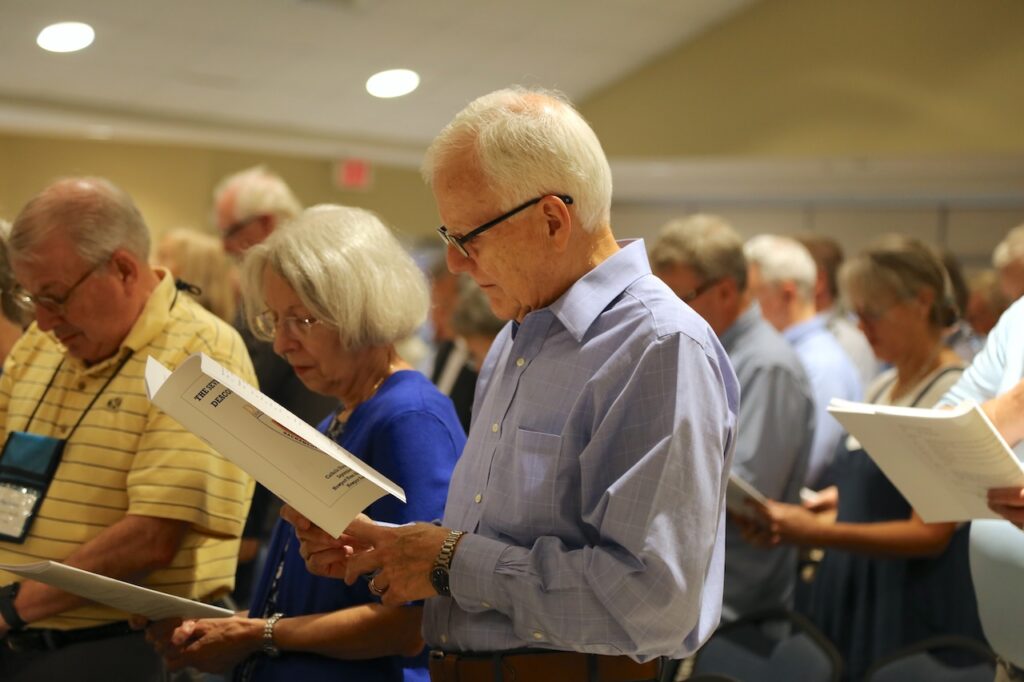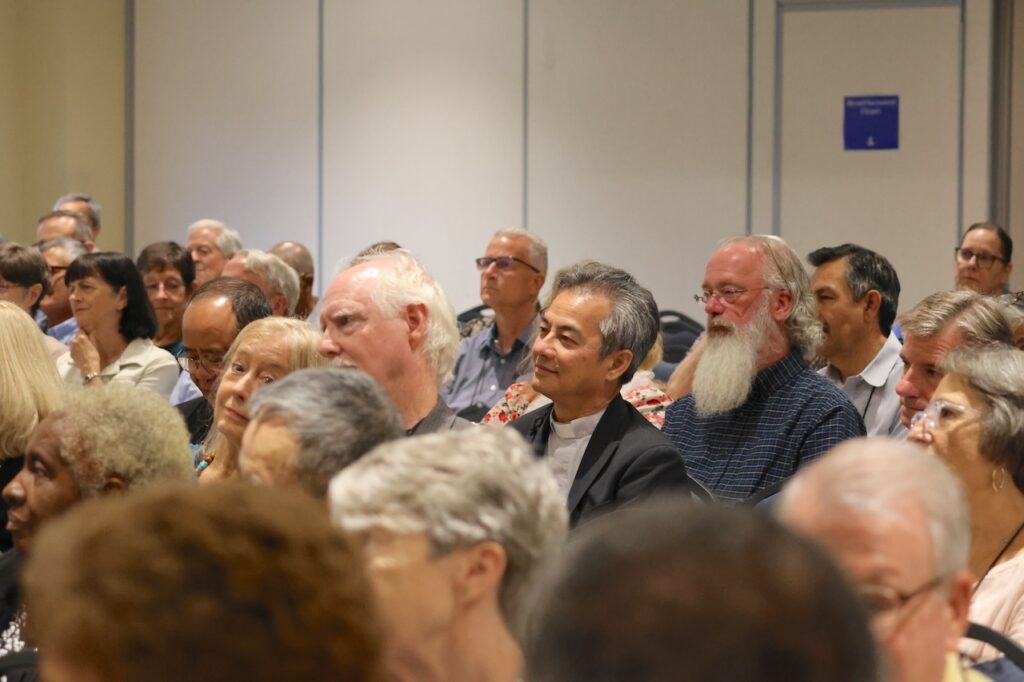Just as the apostles were called to spend time in the community forming people so they could then go out and spread the love of God to the people around them, we are also called to evangelize, and God has equipped us to do so.
Such was the message of keynote speaker Sherry Weddell, executive director of the Catherine of Siena Institute in Colorado Springs, Colorado, at the 18th Annual Convocation of Deacons, held Sept. 26-28 at the Newport News Marriott at City Center.
Fellowship and faith went hand-in-hand when 103 deacons and 57 wives gathered at the event, which had the theme “Unity in Diversity.”
The deacons and their wives had the opportunity to visit with old friends and meet new ones, pray together, and go to Mass. They also attended seminars and breakout sessions that educated them about evangelization, charisms, spiritual mentorship, intercultural competencies, and marriage preparation.
Bishop Barry C. Knestout celebrated the opening Mass on Sept. 26 at Our Lady of Mount Carmel, Newport News. The bishop ate dinner with the deacons and their wives, gave opening remarks in which he thanked them for their service, then spent time later that night in fellowship with the deacons.

“It was really great that the diocese offers this, because it gives us an opportunity to learn and to reconnect with people and to share our experiences,” said Maureen Eckert, who attended the convocation with her husband, Deacon Jim Eckert, of Church of the Epiphany, North Chesterfield.
Likewise, Deacon Andy Ferguson, of St. Michael the Archangel, Glen Allen, said that it is “always good to catch up with my fellow deacons.”
Deacon development
In her morning presentation, Weddell said there are three stages of adult Christian development, the first being the “Seeker” who may attend Mass simply out of obligation and who is beginning to walk with Jesus.
“Basically, ‘Seeking’ covers the entire early spiritual journey, from ‘maybe I don’t even believe in a personal God and don’t trust the Church,’ through the stages or thresholds of spiritual trust, curiosity, openness to the point where ‘I first begin to start following Jesus as his disciple in the midst of his Church, which we call intentional discipleship,’” she later explained to The Catholic Virginian.
People in the second stage, the “Disciple,” continue to be transformed, Weddell further explained. They begin to worship, serve, study, and discern – not out of guilt or obligation, but out of a living, growing relationship with God. This is a fruit-bearing stage where charisms start to manifest.
The final stage, which she called spiritual adulthood, is the “Apostle” who spreads the word about Jesus to others.
“Spiritual adulthood changes the person, the culture and the conversation. That is the great reward,” Weddell said.
Although all Catholics are called to be apostles, Weddell said most people unfortunately remain “spiritual infants.” It is the apostle’s job to guide the person to the final stage. Knowing which stage people are in will help the apostle meet them where they are.
One way to do that is to ask them to share stories of their experiences or relationship with God. The evangelist should just listen – not judge, correct or catechize – but rather try to just understand their perspective, she said.
“Helping Catholics and ‘Nones’ become open to the possibility that the God of Christianity does exist, the God who sees you, cares about you, hears you, responds to you and has the power to answer your prayer is increasingly one of our first tasks,” Weddell said.
“Emerging disciples and apostles around you is evidence that your vocation as a deacon is bearing fruit,” she continued. “In catechizing, preaching and counseling, the deacon motivates, facilitates and animates the laity in their apostolate in the world.”

All are called
Evangelization, though, is not the sole responsibility of the clergy and religious. Rather, by baptism, all Catholics are called to evangelize. Every parish is a center of mission, and every person is sent on that mission, with each layperson playing “a crucial role in this whole dynamic so that all of us together can answer God’s call,” Weddell said.
“He calls us to follow him; he calls us to bear his fruit for the sake of many others,” she said. Spiritual fruit always emerges from a “growing relationship with the personal God who is all loving, all knowing, all powerful.”
She cited Galations 5:22-23 which says the fruit of the Holy Spirit is love, joy, peace, patience, kindness, goodness, faithfulness, gentleness and self-control.
Everyone is gifted a charism at baptism through the Holy Spirit that can help them evangelize, Weddell said.
“There’s only one purpose for these gifts and that is to be a channel of God’s love and beauty and mercy and truth and healing and provision of others,” she said, adding that charisms “enable us to do things that transcend our background and education, have an impact that transcends human ability and involve a lot of creativity.”
She listed some charisms as administration, celibacy, craftsmanship, encouragement, evangelization, leadership, music, service, teaching, voluntary poverty, wisdom and writing.
Weddell quoted Pope St. John Paul II when he said that “everyone must be helped to embrace the gift entrusted to him as a completely unique person and to hear the words which the Spirit of God personally addresses to him or her.”
In his talk on spiritual mentorship, Deacon David Reaves, of St. Joseph, Hampton, said, “We have all these gifts that need to be expressed but they are pressed down by life.”
Many people feel “weighted down” by life’s challenges, such as sin, family troubles and addiction, but “we all have the Holy Spirit who has been given to us by sanctifying grace and have charisms.”
Spiritual mentoring can help unlock those charisms. It can help people encounter God and become apostles themselves, he said.
“There may be something deep inside of you that you have been doing your entire life because God is preparing you for a ministry in a way that you might have never expected,” Deacon Reaves said.
Deacon Eckert could relate to that. He said that giving winery tours when he lived in California made him comfortable talking in front of large groups of people which he does now as a deacon. Similarly, Deacon Reaves said owning his own business and talking one-on-one with his employees prepared him for his work as a deacon.
“When you begin to point people back to him (Jesus) in a directed way so that they can really enter into the things that are holding them back from living the fullness of who they were created to be, to allow the expression of sanctifying grace in their life to go off like fireworks,” he said, “then it is amazing what begins to happen to them.”
See more photos from the Deacon Convocation.

